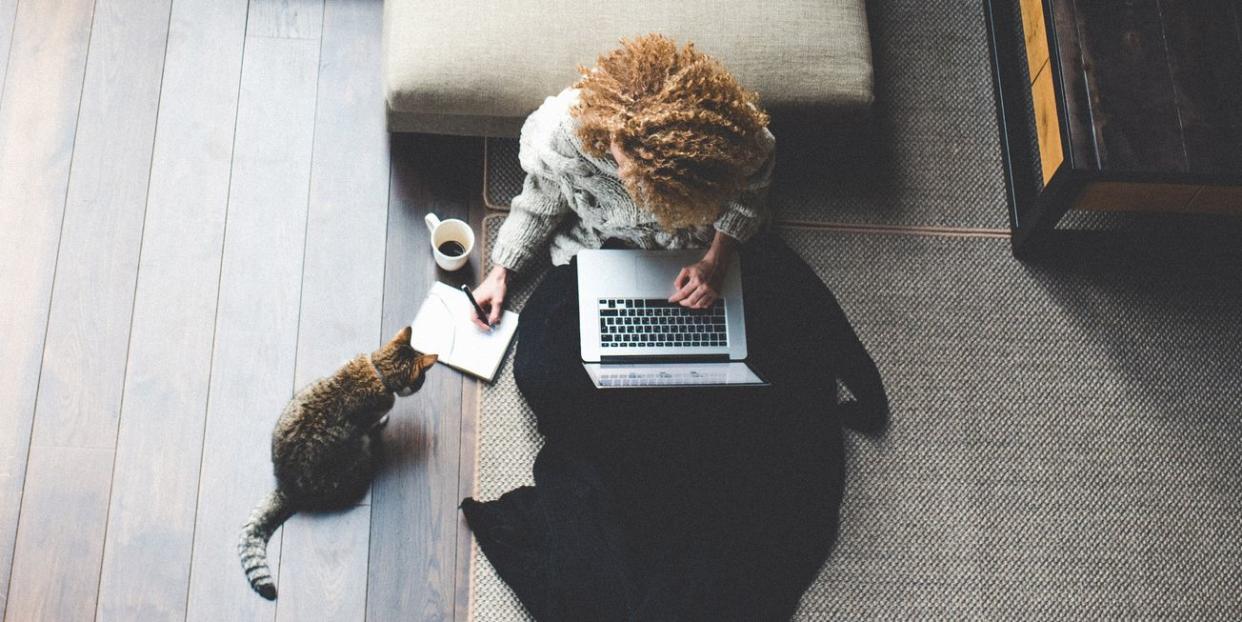How to Stay Calm and Productive While at Home During the Coronavirus Outbreak

By now, you've probably been told you should stay home. Your friends are saying it, experts are saying it, even Ariana Grande is saying it. In keeping ourselves distant from each other as much as possible, we are helping to stop the novel coronavirus from spreading and, in turn, helping hospitals and healthcare workers from being overcrowded and overwhelmed.
As we settle into this new normal of spending much, much more time homebound, many are asking ourselves, How do I sustain some sense of normalcy in these extremely abnormal times?
At ELLE.com, we've been swapping all the strategies we're slowly discovering. "I'm embarrassed by how much I love rules, even if they're self-imposed," our Deputy Editor Jessica Roy shared, before explaining how she's making a detailed schedule for herself every day.
Other tips include:
Writing down individual goals for each day, such as "read 50 pages of a book."
Signing up for livestream workout classes. This way you have a designated time to stop working, and you won't bail on being active because you will have paid for a class. (Here's the one I'm trying this week.)
Setting up FaceTime dates with friends. Pick a night to all cook separate dinners and then sit down for a virtual group meal.
Making any type of evening plans! Staff writer R. Eric Thomas says, "I'll tell myself at 6:30 I get to watch a show I've been looking forward to or read a book, something to signal the work day is over."
Getting up at your usual time and going for a short "commute" walk every morning.
Helping local businesses. Use the money you're not spending going out to buy restaurant gift cards for your friends. It might lift their spirits and give them something to look forward to once this all passes.
Practicing simple exercises for anxiety, like this and this.
ELLE.com also spoke to psychologist Mary K. Alvord to get her expert advice on what we can all do to stay productive and calm. "One of my areas is resilience," she explains. "The core of resilience is the thinking and the belief that while you can't control a lot of aspects of your life, you can control many aspects of your life. Focus on: What can you control and what can you do?" For those working from home, she suggests varying your activity. In a workplace, breaks are natural: You get a cup of coffee, you talk to somebody, you move your body. When at home, it's essential to schedule those pauses in and pace yourself to stay productive.
This is especially important if you're spending more of your day talking to colleagues through webcam, according to psychologist Inna Khazan. She told ELLE.com, "Some people find that interacting with others over webcam to be more tiring than in-person interactions. It would help to schedule 15-20 minute breaks between virtual meetings, to give yourself a chance to recover."
And be sure to ask for help when you need it. Khazan explains that working from home can sometimes make us feel like we should be handling all our problems on our own, which can be isolating and create more anxiety. "In a typical workplace, it is easy to pop your head into a colleague’s office and ask a question. Do the same thing via chat or video from home."
Just as you want to keep up a normal routine with your coworkers, do the same with your friends and family, and check in on the people you love. "We keep hearing this term 'social distancing,'" Alvord says. "We really want to have physical distance, but main social connection." But if you do notice yourself feeling isolated and getting more anxious than normal, Alvord recommends taking a few deep breaths by blowing out air like you're blowing a balloon. (The act of blowing out will automatically make you take a deep breath in.)
Khazan also suggests using the acronym FLARE: Feel, Label, Allow, Respond, and Expand. In terms of anxiety, that would mean noticing any uncomfortable feelings; labeling your experience with a short word like "worry" or "uncertainty"; allowing yourself to feel without judgement; responding in a way that allows you to disengage from the anxiety, like taking those slow breaths; and expanding your awareness by observing sights and sounds around you. "This step allows you to see the uncertainty as a part of your experience, not all of your experience."
Be kind to yourself, and stay optimistic. "This will not last forever," Alvord reminds us. "It may feel like, and be, a very long time, but it's not forever."
You Might Also Like

